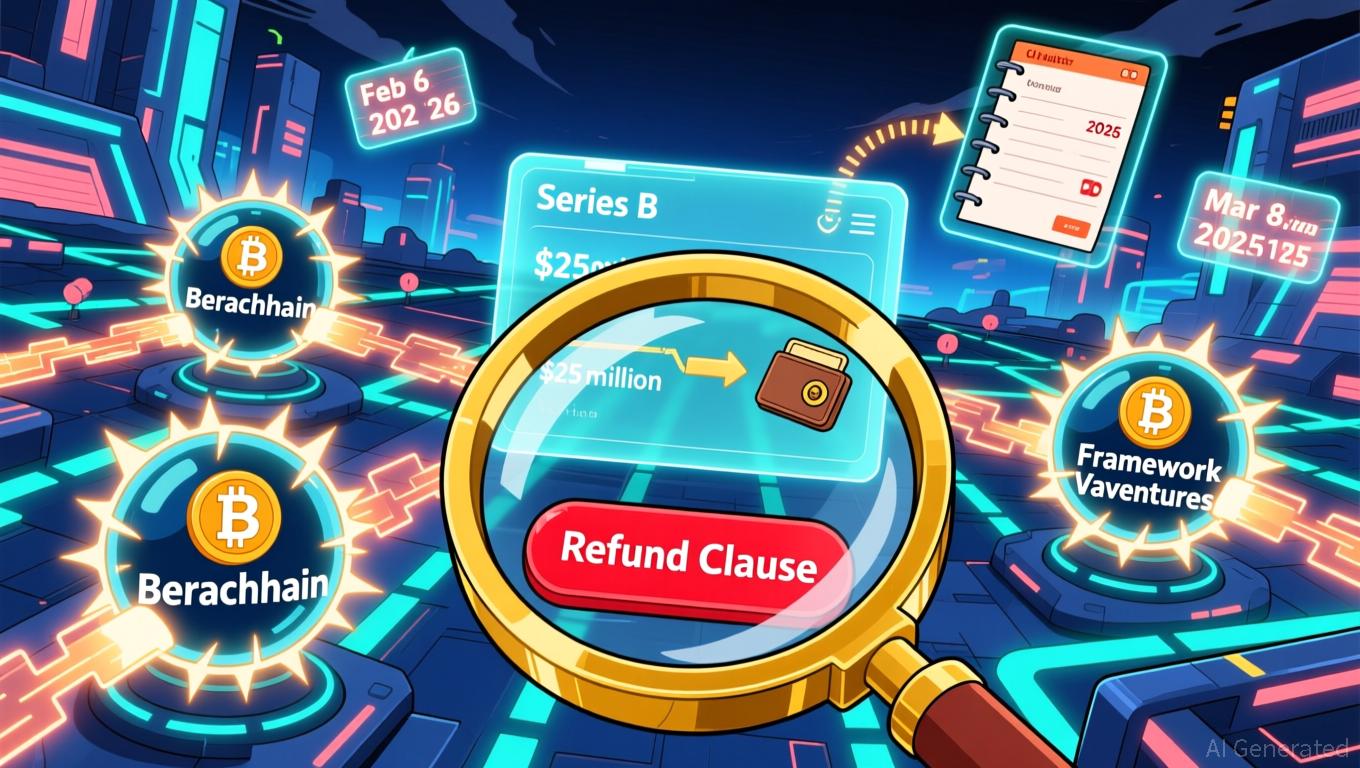Berachain's Refund Policy Balances Safeguarding Investors With Ensuring Project Longevity
- Berachain co-founder denies claims of a $25M refund clause in its Series B funding, calling reports "inaccurate and incomplete." - The clause allows Nova Digital to reclaim its $25M investment until February 2026, triggering legal criticism for its "highly unusual" post-TGE refund terms. - Legal experts warn the clause may violate MFN rights, as undisclosed terms could disadvantage other investors while shielding Nova from downside risk. - The $100M Series B deal at $1.5B valuation has intensified debate
Berachain's co-founder has labeled reports about a $25 million refund clause linked to its Series B funding as "misleading and lacking context," as scrutiny mounts over the layer-1 blockchain's financing arrangements. The debate focuses on a provision allowing Brevan Howard's Nova Digital fund to reclaim its full investment up until February 6, 2026, which is one year after Berachain's token generation event (TGE).
This clause has faced significant pushback from legal professionals, who characterize such post-TGE refund provisions as "extremely rare" in token fundraising deals.
The agreement's terms may also present legal challenges.

The Series B funding round, which was co-led by Framework Ventures and Nova Digital,
Brevan Howard Digital and Nova co-founder Ashwin Ramachandran chose not to respond
Disclaimer: The content of this article solely reflects the author's opinion and does not represent the platform in any capacity. This article is not intended to serve as a reference for making investment decisions.
You may also like
XRP News Today: XRP's ETF-Fueled Surge Encounters Major Barrier at $2.23 While Bulls Strive for Further Gains
- XRP surged 25% above $2, driven by institutional ETF inflows and growing mainstream adoption via products like Franklin Templeton's XRPZ and Grayscale's GXRP . - Technical analysts highlight OBV divergence and 2017 breakout parallels, suggesting potential $3.30–$3.50 retests despite key resistance at $2.23 and moving averages. - Ripple's $500M funding at $40B valuation supports infrastructure expansion, but traders prioritize liquidity metrics over corporate milestones for near-term price momentum. - Reg
XRP News Today: XRP ETFs Ignite Hope, Yet 42% of Tokens in Loss Point to Underlying Risks
- XRP price fell below $2 as open interest hit a 12-month low, with 42% of supply in loss positions despite ETF-driven inflows. - ETFs like XRPC and Bitwise's XRP ETF generated $422M inflows, but Bitcoin's decline and macroeconomic risks overshadowed gains. - Technical analysis highlights $2.00–$2.06 support as critical, with institutional capital potentially stabilizing demand amid structural risks. - Leverage, liquidity constraints, and Fed policy uncertainty amplify downside risks despite SEC's 2025 reg

The Comeback of Momentum ETFs: Could Momentum (MMT) Be the Next Major Opportunity?
- Momentum ETF MMT underperformed in 2025 due to weak tech stocks, contrasting SPMO's 21% gains and $5.4B inflows. - Market shifts favor diversified, low-fee strategies as robo-advisors and tax-advantaged plans redirect capital from concentrated tech bets. - Retail investors prioritize systematic allocation over speculative tech, pushing MMT to adapt via diversification or robo-advisor partnerships. - Institutional interest in MMT rose 84.7% in Q4 2024, suggesting potential if it aligns with modern investo

Stellar News Today: While privacy coins face setbacks, Stellar's compliance-oriented technology drives expansion in international transactions
- Stellar (XLM) emerges as top growth candidate with $169M TVL, 5,000 TPS scalability, and partnerships with Archax/Franklin Templeton. - Zcash (ZEC) gains institutional traction via Cypherpunk's $150M investment but faces regulatory scrutiny over privacy features. - Chainlink (LINK) strengthens DeFi infrastructure but struggles with 30% futures open interest drop and whale selling pressure. - XLM's regulatory alignment (AM Best "A" rating) and cross-border payment focus position it to outperform privacy c
